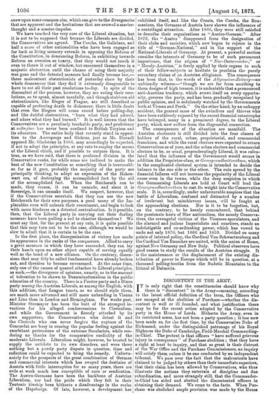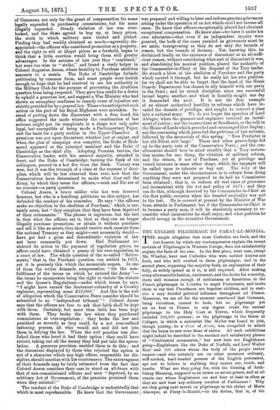DISCONTENT IN THE ARMY.
TT is only right that the constituencies should know why 1 there is " discontent " in the Army—meaning, according to the latest official definition of the term, the Officers who are enraged at the abolition of Purchase—whether the dis- content is well or ill founded, and what justification there may be for the recent action adopted by the Conservative party in the House of Lords. Hitherto the Army, even in its restricted sense, has not been a party question ; it has now been made so, for the first time, by the Conservative Duke of Richmond, under the distinguished patronage of his Royal Highness the Duke of Cambridge, Field-Marshal Commanding- in-Chief. The pretext is that officers "have suffered grievous injury in consequence" of Purchase abolition ; that they have a right at least to inquiry, and that so great is their distrust of the War Office and the Purchase Commissioners, no inquiry will satisfy themk unless it be one conducted by an independent tribunal. We pass over the fact that the malcontents have claimed to be judged by others than their immediate superiors, that their claim has been allowed by Conservatives, who thus illustrate the notions they entertain of discipline and due subordination, and more strangely still, that the Commander- in-Chief has aided and abetted the discontented officers in obtaining their demand. We come to the facts. When Pur- chase was abolished ample provision was made by the House of Commons, not only for the grant of compensation for sums legally expended in purchasing commissions, but for sums illegally expended. Steady violation of law was over- looked, and the State agreed to buy up, at fancy prices, the stock in which military men traded and jobbed. Finding they had readily obtained so much—agreeably dis- appointed—the officers who considered promotion as a property, and the right to sell at illegal prices as a freehold, began to think that a little exertion would bring them still greater advantages. In the autumn of last year they "combined," but were too wise to "strike," and found a ready helper in Colonel Augustus Anson, whose hostility to Purchase abolition amounts to a mania. The Duke of Cambridge forbade petitioning by common form, and some people were foolish enough to hope that he had resolved to use his authority in the Military Club for the purpose of preventing the Abolition question from being reopened. They gave him credit for a desire to uphold a generous law, and support a War Minister who had shown an exemplary readiness to remedy cases of injustice not strictly provided for by a general law. Those who anticipated such action on the part of his Royal Highness were mistaken. In- stead of putting down the discontent with a firm hand, his office suggested the mode whereby the combination of last autumn might put its complaints in a shape not only quite legal, but susceptible of being made a Parliamentary Paper, and the basis for a party motion in the Upper Chamber. A premium was put upon discontent, whether just or unjust, and when the plan of campaign was complete, the Duke of Rich- mond appeared as the principal assailant and the Duke of Cambridge as the chief ally. Adopting Prussian tactics, the Conservative leader, with his assured majority, attacked in front, and the Duke of Cambridge, turning the flank of his colleagues, poured in a hot fire from the flank. Victory was won, but it was the triumph of a class at the expense of disci- pline, which will be less observed than ever, now that the Conservatives have determined to make what they call the Army, by which they mean the officers,—rank and file are of no account—a party question.
Colonel Anson, a brave soldier who has won deserved honours, but who is a headlong politician on this subject, has defended the conduct of his comrades. He says "the officers make no objection to the abolition of Purchase," which is cer- tainly news, but "they complain that they have been deprived of their retirements." The phrase is ingenious, but the fact is, that what the officers say is, that as they can no longer illegally purchase promotion, or obtain it without purchase and sell it like an estate, they should receive such moneys from the national Treasury as they might—not necessarily would— have got had a gross and discreditable violation of law
not been summarily put down. Had Parliament re- stricted its action to the payment of regulation prices, no officer could have obtained a penny of his over-regulation in a court of law. The whole question of the so-called "Retire- ments," that is, the Purchase question, was settled in 1871, yet it is precisely this which the memorials reopen. In one of them the writer demands compensation "for the non- fulfilment of the terms on which he entered the Army "- the terms he enumerates being the right to violate the statute and the Queen's Regulations—under which terms, he says, "I might have earned the lieutenant-colonelcy of a Cavalry regiment, representing some £12,000." And this is the sort of allegation which the Conservative Peers consider should be submitted to an "independent tribunal " ! Colonel Anson says that the officers are free to ask that faith shall be kept with them. Certainly, but more than faith has been kept with them. They broke the law when they purchased commissions at over-regulation ; they broke the law and punished as severely as they could, by a not over-refined
rattening process, all who would not and did not join them in defying the law. When the evil practice was abo- lished those who loved it had their option ; they could have retired, taking out all the money they had put into the specu- lation. A generous provision enabled them to do this ; and the discontent displayed by those who rejected the option is not of a character which any high officer, responsible for dis- cipline, should sanction with his countenance. The extravagance of their demands may be fairly estimated from the fact that Colonel Anson considers their case to stand on all-fours with that of non-commissioned officers and men "deprived, by an arbitrary Act of Government, of the pensions promised them when they enlisted!"
The conduct of the Duke of Cambridge is undoubtedly that which is most reprehensible. He knew that the Government was prepared and willing to hear and redress genuine grievances arising under the operation of an Act which could not foresee all cases. He knew that officers exceptionally placed had obtained exceptional compensation. He knew also—we have it under his own admission—that even if an independent inquiry were granted, the bulk of the cases paraded as grievances must be set aside, transgressing as they do not only the bounds of reason, but the bounds of decency. Yet, knowing this, he declaimed loudly on the existence of discontent as an all-suffi- cient reason, without considering what sort of discontent it was, and abandoning his neutral position, placed the authority of the Commander-in-Chief at the disposal of the Tory leader. He struck a blow at the abolition of Purchase and the party which carried it through, but he really hit his own position, for we shall not be able to forget that the head of the Horse Guards' Department has chosen to ally himself with one party in the State ; and he struck discipline, since one successful inroad begets another, and what is humbly sought one day is demanded the next. It is not the first example of an almost authorised hostility to reforms which have in- vaded the domain of privilege, and sought to convert a class into a national army. We do not forget the speeches of Lord Abinger, when the gunners and engineers received an instal- ment of justice ; nor the transactions at Sandhurst, or the talk in the House of Lords which preceded and encouraged that display; nor the canvassing which preceded the petitions of last autumn, followed by the memorials of this spring. "New Presbyter is but old Priest writ large." These and other proceedings led up to the party vote of the Conservative Peers ; and the con- stituencies should bear in mind steadily that a Tory restora- tion means, for one thing, the vitiation of military reform, and the return, if not of Purchase, yet of privilege and vested interests in some other shape, which the taxpayer will be called upon to tolerate or buy out. The duty of the Government, under the circumstances, is to refrain from doing anything they were not prepared to do had no Commission been obtained ; that is, to redress all real cases of grievance not inconsistent with the Act and policy of 1871; and they can do this, although deserted by the Commander-in-Chief on the first public occasion when his boasted neutrality was put to the test. He is covered at present by the Minister of War from attacks in Parliament, but if the Commander-in-Chief is to become a party man, it will be absolutely necessary to re- consider what immunities he shall enjoy, and what position he should occupy in the executive Government.































 Previous page
Previous page